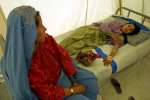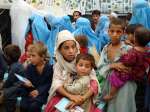- Text size
 |
|  |
|  |
| 
- عربي
A childhood regained on Kos
News Stories, 11 November 2015
KOS, Greece, Nov 11, (UNHCR) – Although he is only 14 years old, Samir's face shows a maturity and a seriousness well beyond his age. He has experienced far too much for a child.
"I have seen many scary things," the Afghan orphan told the UN refugee agency recently in a transit facility for unaccompanied children on the Greek island of Kos. "On my way to Greece, I was arrested by armed men, detained and beaten up on several occasions."
Amid the continuing influx of more than 650,000 refugees and migrants to have entered Greece so far this year, Samir is one of thousands of unaccompanied children risking their lives to flee Syria, Iraq, Afghanistan and other conflict areas in search of safety and a better future.
UNHCR supports national authorities in their obligation to receive them in safe and dignified conditions.
On the night of his arrival in Kos aboard a crowded smuggler boat from Turkey, volunteers described Samir as soaking wet and looking "helpless and confused."
UNHCR staff, who identify unaccompanied children among the larger groups of refugees and migrants, immediately contacted the authorities and its Greek NGO partner, Praksis, to arrange Samir's transfer to the transit facility that opened on Kos on October 30. Supported by UNHCR and run by Praksis, the new facility offers food, medical care, psycho-social attention and accommodation to all children arriving on the island.
Since the beginning of this year, more than 51,000 people arrived on Kos after making the dangerous crossing from Turkey to the island, a four-kilometre journey at its narrowest point. Given the transient nature of the influx – most refugees move on from the island to the Greek mainland in only a few days – there is no firm figure for the number of unaccompanied children among the arrivals on Kos.
But every day, the UNHCR team identifies people with needs – particularly children who travel without any relatives -- and guides them through the necessary steps to guarantee that they receive proper care and their rights are respected.
Like many other children before him, Samir made his way from Afghanistan to Greece without any family member or other person of trust. He had, however, travelled within a larger group of Afghans, which offered him only minimal protection.
After what he described as a frightening, three-month trip through Iran and Turkey and the dangerous boat ride to the Greek islands, he finally found refuge in the Kos transit centre.
Until recently, unaccompanied children were kept in police custody due to the lack of child-friendly reception conditions on Kos. This lack of space in reception centres meant children between 11 and 17 years old had to be kept in police cells. They were often held in very poor conditions, for several weeks until their transfer to Athens, where Praksis and other NGOs offer proper services and facilities for such children.
"The new UNHCR-Praksis transit facility is a game changer for unaccompanied children arriving in Kos," said Marco Procaccini, UNHCR's Head of Office on the island. "It finally offers an alternative to detention, providing children with a dignified shelter in a safe and friendly environment. That is exactly what they deserve in such circumstances."
Samir said his only surviving family member is a 17-year-old brother living legally in a European country, hence his decision to make the long and perilous journey.
"After the death of my parents, I only have one brother left, and I came here to be with him," Samir said.
With its team of social workers, doctors, psychologists and also lawyers, Praksis will be able to assist Samir in the steps he has to take in order to regularize his status in Greece, and eventually be legally reunited with his brother.
Within a week of its opening, the UNHCR-Praksis transit facility in Kos had already hosted 25 children from Syria, Afghanistan and Pakistan.
A UNHCR Protection Officer Hannah Simon explained: "Before the opening of the facility, unaccompanied children fearing detention used to hide their age or tried to be registered with unknown adults, pretending to be related to them. They remained exposed to abuse while continuing their trip without being identified as children in need of support and protection."
The centre, which can accommodate over 20 children, provides an environment where they will feel protected while individual solutions which are in the best interest of the child can be devised -- being it staying in Greece or assisting them to be reunified with their families elsewhere.
After only a few days in the facility, Samir seemed to have regained his childhood, and was already looking forward to a safe future.
"I have met a lot of nice people, made new friends, and I have a good time with them," Samir said, smiling broadly. "At last, I am no longer afraid."
















































